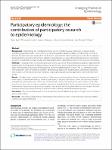Participatory epidemiology: the contribution of participatory research to epidemiology
Bach, Mario
Jordan, Susanne
Hartung, Susanne
Santos-Hövener, Claudia
Wright, Michael T.
Background: Epidemiology has contributed in many ways to identifying various risk factors for disease and to promoting population health. However, there is a continuing debate about the ability of epidemiology not only to describe, but also to provide results which can be better translated into public health practice. It has been proposed that participatory research approaches be applied to epidemiology as a way to bridge this gap between description and action. A systematic account of what constitutes participatory epidemiology practice has, however, been lacking. Methods: A scoping review was carried out focused on the question of what constitutes participatory approaches to epidemiology for the purpose of demonstrating their potential for advancing epidemiologic research. Relevant databases were searched, including both the published and non-published (grey) literature. The 102 identified sources were analyzed in terms of comparing common epidemiologic approaches to participatory counterparts regarding central aspects of the research process. Exemplary studies applying participatory approaches were examined more closely. Results: A highly diverse, interdisciplinary body of literature was synthesized, resulting in a framework comprised of seven aspects of the research process: research goal, research question, population, context, data synthesis, research management, and dissemination of findings. The framework specifies how participatory approaches not only differ from, but also how they can enhance common approaches in epidemiology. Finally, recommendations for the further development of participatory approaches are given. These include: enhancing data collection, data analysis, and data validation; advancing capacity building for research at the local level; and developing data synthesis. Conclusion: The proposed framework provides a basis for systematically developing the emergent science of participatory epidemiology.
No license information

